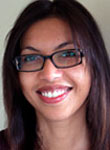Smartphone app for bipolar patients wins $100K prize
By Bill Steele

A smartphone app to assist people with bipolar disorder, conceived by Cornell researchers, has won the prestigious $100,000 Heritage Open mHealth Challenge.
The app for iPhone and Android phones, called “MoodRhythm,” was developed by a team led by Tanzeem Choudhury, associate professor of computing and information science, and postdoctoral fellow Mark Matthews. It uses a phone’s microphone, light sensors and accelerometer to monitor sleep and social patterns and combines this information with what the patient reports about daily activities, food routines and mood to learn what situations have positive or negative outcomes. The app gives the patient helpful advice to maintain a regular daily rhythm, while gathering vital information for the patient’s doctor.
Bipolar disorder, also called manic depression, affects some 5.7 million American adults in a given year and is characterized by extreme mood swings from a happy, hyperactive state to extreme depression. It is associated with poor functional and clinical outcomes, high suicide rates and huge societal costs.

“Rhythms guide our lives,” Choudhury explained. “Our biological clocks tell us when we need to sleep, eat and wake. When these rhythms are interrupted or obstructed, it can be difficult for our bodies to get what they need to stay healthy and balanced.”
The app can replace traditional paper diaries that patients often find difficult to maintain. It was designed in collaboration with patients and clinicians, and is based on Choudhury’s earlier experiments with using smartphones sensors to detect social interactions, stress and sleep. To protect privacy, the phone does not listen in on the content of speech, but notes variations in pitch, volume, speaking rate and other characteristics to measure emotional states.
“It is one of the greatest challenges in health care to develop cutting-edge technology that not only meets clinical needs but that can be incorporated with ease into patients’ lives,” Choudhury said.
Co-sponsored by Heritage Provider Network, Open mHealth and the University of California, Los Angeles, the Open mHealth Challenge was created to catalyze the development of mobile applications that promote mental and physical health.
Choudhury directs the People-Aware Computing group at Cornell, which develops systems that can reason about human activities, interactions and social networks in everyday environments. The group creates mobile apps to monitor physical and mental health, and is experimenting with the idea of exploiting the ubiquity of smartphones to gather public health data from large populations.
Open mHealth was co-founded by Ida Sim, professor of medicine at the University of California, San Francisco, and Deborah Estrin, professor of computer science at the Cornell NYC Tech campus, to create a universal language for mobile mental health software, enabling all applications in the field to work together. Choudhury’s team is contributing both a novel method to detect sleep and a sensing module to identify levels of social interaction to the Open mHealth software library.
Media Contact
Get Cornell news delivered right to your inbox.
Subscribe